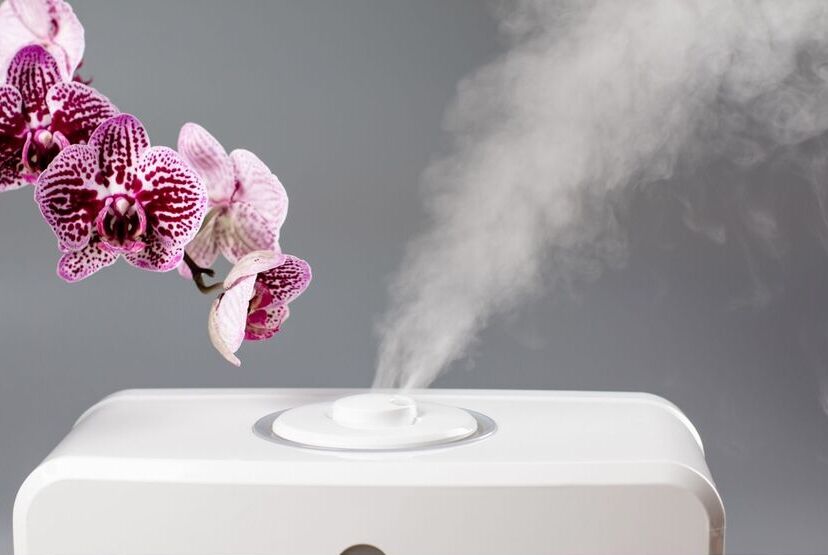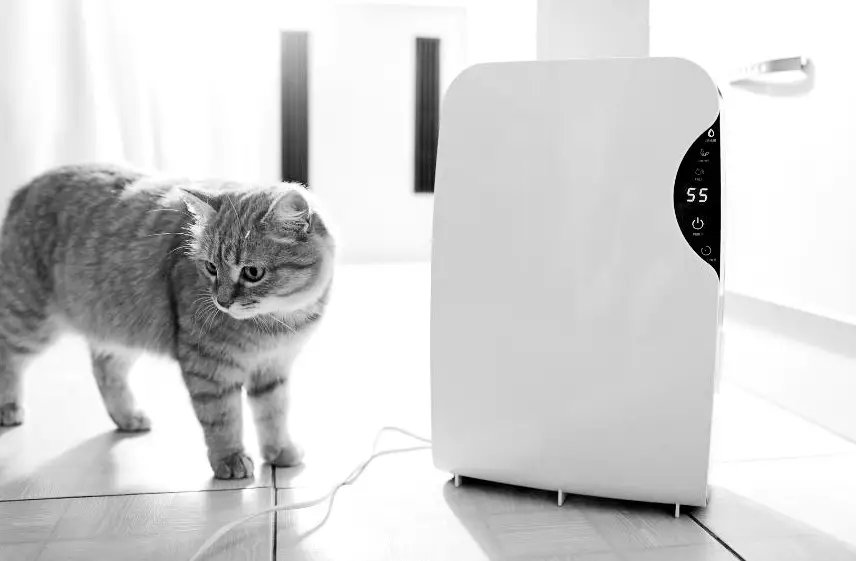Keeping the climate inside the home at an even kill is sometimes a little hard to do.
Too much moisture has its set of problems, too little moisture has its own.
And finding the right device to helping either situation can be confusing.
For instance,
Table of Contents
Do air purifiers dry out the air?
Air purifiers do not dry out air. Air purifiers are responsible for removing pollutants from the air like allergens, spores, dander, and dust. But they do not have any mechanism to either add or take moisture from the air. They will clean your air but they can do nothing to reduce the humidity.
Dehumidifiers are the device needed to dry the air and remove excess humidity. Dehumidifiers will bring the level of humidity in a room down to a comfortable level and reduce indoor air quality issues like dust mites and mold spores.
Refrigerated air conditioners also help dry the air out and many of them come with a setting called “dry mode”. Using the dry mode setting will essentially turn your air conditioner into a dehumidifier while it is in that mode.
Typically if the air in the room is extra dry it can be related to the air conditioning or heating.
Air conditioners use the humidity in the room to lower the temperature. But sometimes depending on the climate, can pull too much humidity out of the room and cause the air to be dry.
Heaters on the other hand can just plain dry out the air like a hair dryer.
Does an air purifier cause dry throat?
No an air purifier does not cause dry throat. The function of an air purifier is to clean the air, not to add or take away moisture from the air. Dry throat usually happens when the air is to arid.
Air conditioning in your home is more likely the culprit for dry air. Though the main point of an air conditioner is to cool off the room, it will also dry out the air in a room when there is not enough humidity in the air.
In the winter though, running the heater all the time can also dry out the air causing dry throat, dry cough, clogged nasal passages, and many more.
 Do air purifiers dry out sinuses?
Do air purifiers dry out sinuses?
Air purifiers do not dry out the sinuses. Air purifiers do not humidify or dehumidify the air in any way.
Air purifiers simply move air through a series of filters to rid the air of airborne molecules such as pollen.
Sitting too close to a air purifier however may make you feel “sinusy” because that’s the point that all the dust and germs are being pulled to from around the room.
In other words the air directly around the air purifier is the most polluted air in the room.
Can air purifiers cause breathing problems or make allergies worse?
Sitting or sleeping next to an air purifier can in fact make your allergies worse and cause breathing problems. The reason is because when you are sitting or sleeping near the air purifier, you are in the line of fire of all the contaminants that are being pulled towards the air purifier.
Air purifier should be placed on the opposite side of a room from where you are sitting. The idea of the air purifier is to filter the contaminants in the air away from you so that you are not breathing in the pollutants.
When you are sitting or sleeping near a air purifier, the pollutants in the air are being drawn by the air purifier to your side of the room. That means that you are more likely to be breathing polluted air in the vicinity of the air purifier
Air purifiers however do not do anything to help dry out the air or dry out your sinus cavities.
Different seasons of the year require different approaches to humidity.
The humidity in the summer, especially in the hottest months of July and August can be overbearing and require different methods of lowering the humidity in order to be comfortable and reduce the strain that high humidity has on air conditioning equipment.
When the humidity is too high, a dehumidifier is a machine that can take moisture out of the air.
As opposed to the winter months when humidity can actually dip under the point of comfortability.
Especially low humidity can cause your home to be extra dry especially when the heater is running non stop to combat the freezing temperatures outside.
During these times of the year, a humidifier will add moisture back into the air.
 Do air purifiers help with moisture?
Do air purifiers help with moisture?
No. Air purifiers do not do anything to add or reduce the humidity in a room.
Do air purifiers dehumidify?
No. Air purifiers can help reduce airborne allergens housing inside of the humidity but they cannot reduce the amount of humidity in the air.
A dehumidifier is a device that is specifically used to lower the humidity in a house.
A humidifier will add humidity back into the air.
Do air purifiers make the room cold?
No. Air purifiers do nothing to cool or heat a room. Air conditioners and heaters are devices that change the temperature in the room.
But on the subject of humidity, a dehumidifier can help cool a room that has too much moisture.
Humidity not only feels hot in the summer, it also causes the air conditioner to feel like it is not running.
A dehumidifier will lower the humidity and take the strain off the air conditioner and return your indoor climate to a level of comfortability.
Do air purifiers create moisture?
No. Air purifiers do not create moisture. They work to clean the air regardless of the humidity or lack of humidity in the air.
Low and high humidity can be corrected by using either a humidifier or a dehumidifier.
An air purifier is a air cleaning device and will do nothing to add or take away moisture from your air.
Can you use a dehumidifier and an air purifier and the same room?
Yes. You can absolutely use a dehumidifier and an air purifier in the same room.
They do not work against each other in any way
There is a caveat.
Though an air purifier cannot do anything to dehumidify a room,
A dehumidifier on the other hand can help cleanse the air of airborne allergens and act like a air purifier.
The reason is, high humidity not only is uncomfortable, it also facilitates the growth of mold spores and dust mites.
By using a dehumidifier to bring down the level of humidity inside the home, you are also inadvertently lowering the capacity for mold and dust mites to thrive. Inadvertently creating cleaner air in the process.
So just purchase the dehumidifier instead of the air purifier?
Unfortunately it doesn’t work that way.
There’s only a few of months of the year when a dehumidifier is needed.
A dehumidifier in the winter can actually cause the opposite effect, and dry the air too much. Which leads to a bunch of coughing and swollen nasal passages.
An air purifier, on the other hand, will work anytime of the year to reduce airborne allergens including mold spores and dust mites.
Can you use a air purifier and a humidifier at the same time?
Yes. Air purifiers clean the air and humidifiers add moisture to the air so there is no conflict of interest. Both will work well independently of each other.
There are times when humidifiers and air purifiers work well together to create a climate that is conducive to wellness.
For instance, adding a humidifier to a dry room will help reduce swollen nasal passages and an air purifier will help reduce airborne allergens that are entering in to the nasal passages.
So both working together help create a much more comfortable area to catch your breath and sleep easier.
Do air purifiers need water?
No. Most all air purifiers do not need water to work.
But there is a type of air purifier called an air washer that uses water as a filter.
These air purifiers are considered air purification- humidifier combos.
As an expensive humidifier, these units cannot be beat.
But as an air purifier, they are not as effective as a HEPA filter cleaner and also are not suitable for the entire year since there are times of the year when adding humidity through the air is not wanted or needed.
Many people find them desirable because they do not require any sort of filter replacement. But there is the usual filling the water tank and keeping the unit clean of mold that is usually associated with humidifiers.
Summary
Air purifiers do not do anything to add humidity or take away humidity from the air.
They are devices that reduce airborne allergens regardless of the moisture in the air.
Dehumidifiers reduce the moisture in the air.
Humidifiers increase the moisture in the air.
The effects of dry air in the home can cause dry throat, dry sinuses, coughing, and swollen nasal passages.
But dry air is usually caused by either the air conditioner or the heater running overtime it has nothing to do what is an air purifier.
An Air purifier on the other hand can help reduce allergens in the air that would also help reduce the symptoms created by dry air.


 Do air purifiers help with moisture?
Do air purifiers help with moisture?







